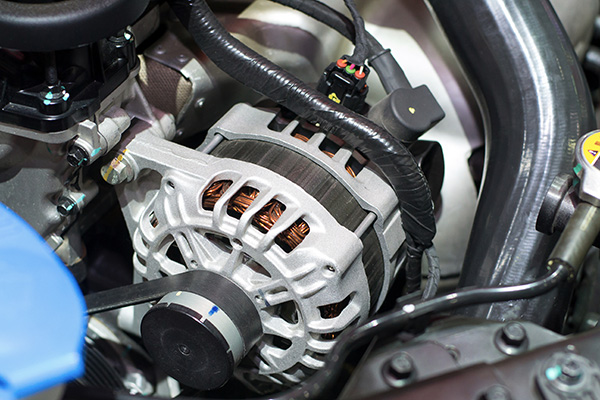
Your car's alternator might not get the same attention as the engine or transmission, but it's also keeping your vehicle running. The alternator is responsible for powering your car's electrical systems and charging the battery. It is a true workhorse under the hood. However, like any component, it does wear out over time. So, how do you know when it’s on its last legs?
Dim or Flickering Lights
One of the earliest signs of alternator trouble is dim or flickering headlights. If you notice that your headlights seem unusually dim when you’re driving at night, or they flicker when you’re idling, this could be a red flag. The alternator is responsible for supplying consistent power to your car's electrical components, including the headlights. When it starts to fail, it may not be able to keep up with your vehicle’s power demands, resulting in dimming lights.
But it’s not just the headlights you need to watch out for. You might also notice interior lights that aren’t as bright as they should be or dashboard lights that seem to fluctuate. These are all signs that your alternator might be struggling to do its job.
Warning Light on the Dashboard
Most cars are equipped with a dashboard warning light that indicates problems with the charging system. This light often looks like a battery symbol, but it could also be labeled "ALT" or "GEN." If this light comes on while you're driving, it’s a clear indicator that your alternator isn’t generating enough power.
However, don’t panic just yet. A warning light doesn’t always mean your alternator is completely failing. It could be something as simple as a loose connection or a worn-out belt. Either way, it’s best to get it checked out sooner rather than later to avoid getting stranded.
Strange Noises Under the Hood
No one likes to hear strange noises coming from their car, but sometimes, they can be helpful warning signs. If your alternator is on its way out, you might hear a growling or whining sound from under the hood. A misaligned pulley, worn-out bearings, or a failing internal component in the alternator usually cause this noise.
The noise might start out faint but can get louder over time. Don’t ignore it! The last thing you want is for your alternator to give out completely when you’re miles away from home.
Frequent Dead Battery
It’s normal for a car battery to run out of juice if you leave your lights on overnight or don’t drive your car for a while. But if you find yourself needing a jump-start more often than not, it might not be your battery that’s the problem. A failing alternator won’t be able to recharge your battery as you drive, leading to frequent dead battery situations.
A quick way to test this is to jump-start your car and then disconnect the jumper cables. If your car stalls immediately, it’s likely your alternator isn’t keeping the battery charged.
Electrical Issues and Malfunctioning Accessories
Today’s cars are packed with electronic features like power windows, heated seats, and infotainment systems. When the alternator is struggling, you might notice these accessories acting up. For instance, your radio might turn off by itself, power windows might move slower than usual, or your seat warmers might stop working.
These electrical issues occur because the alternator isn’t supplying enough power to run all these systems simultaneously. If you start to see multiple electrical components failing at once, it’s a good idea to get your alternator checked out.
Burning Smell
A failing alternator can produce a distinct burning smell. This could be due to an overheated alternator belt or wires that are working overtime to compensate for the failing alternator. If you notice a burning rubber smell, it’s a sign that the alternator belt might be wearing out. On the other hand, a burning electrical smell could indicate that wires or other internal components are overheating.
Don’t ignore this warning sign, as it could lead to more significant (and more expensive) repairs if not addressed promptly.
Difficulty Starting the Car or Frequent Stalling
If your car is having trouble starting, it might not just be the battery’s fault. The alternator plays a key role in getting your engine going by providing power to the ignition system. A weak alternator may cause the engine to crank slowly or not at all. Additionally, if your car stalls frequently after starting, it could be because the alternator isn’t providing enough power to keep the engine running.
Unsure about that strange noise under the hood? Let the experts at Chicane Motorsport take a look. We specialize in inspections, maintenance, and repairs to keep your car in top shape.